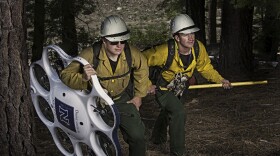The rain is helping to stamp out fires in the West, but wildfire season isn’t over yet. In fact, drought and high temperatures have expanded the fire season from a summertime concern to a year-round worry. Rachel Cleetus, with the Union of Concerned Scientists, says that's a health issue.
“That smoke endangers not just the immediate environment; it can be carried hundreds of miles away. So this year when there were these fires in California – the Valley Fire, the Butte Fire, and so forth -- we were seeing smoke carried to Reno, Nevada and other places.”
The smoke from those fires can be harmful to young children, the elderly, and anyone with respiratory or heart conditions, according to Dr. Brian McCormack, with Renown Health in Reno.
“Worst-case scenario, we’ll see widespread complaints from even lots of normally healthy people complaining of itchy, irritated maybe tearing eyes, maybe a runny nose they wouldn’t expect to have this time of year, and then cough, shortness of breath, maybe even tightness in the chest.”
Both experts say even a small amount of smoke – like that generated by the controlled burns starting in the Tahoe Basin this week – can cause health issues. All of which equates to increased healthcare costs. Reno-Sparks hospitals spent $2.2 million dealing with the last severe fire season, in 2008.






